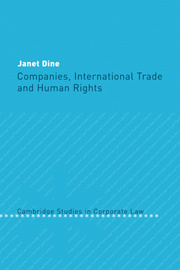Zaradené v kategóriách: ZAHRANIČNÍ LITERATURA
Companies, International Trade and Human Rights
Dine Janet
ISBN
978-0-521-14182-6
EAN
9780521141826
Originally published in 2005, this book focuses on the role of corporations within the trading system, and the complex relationships between corporations, nation states and international organisations. The actions and motives that drive corporations are considered as well as the structure of the international trading system. Remedial devices such as Codes of Conduct and Human Rights instruments are assessed for effectiveness. The book seeks reasons for what is a growing understanding that international trading regimes are not meeting objectives found in many international agreements, including both the international trade agreements themselves (WTO, GATT, TRIPS etc.) and human rights instruments. In particular, it is clear that the prevalence and severity of poverty is not being adequately addressed. This work sets out to investigate the role played by companies in this failure in the globalisation of trade to realise its aims, in particular the failure to achieve the minimum of basic rights, the right to food.
Contributes to the 'globalisation' debate, looking at the role which the giant corporations play in relation to states, the IMF, the World Bank and the World Trade Organisation
Examines both general and detailed issues in the debate: very topical post-Enron
Written by a highly respected international scholar
Ostatní s tímto titulem kupují:
-
Položka byla přidána do košíku.
















